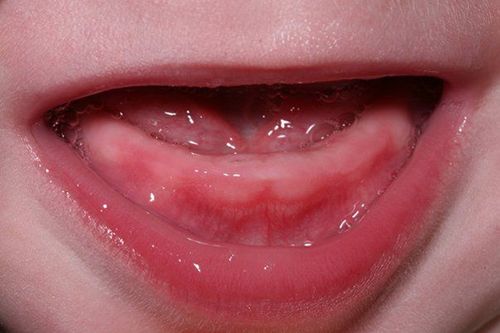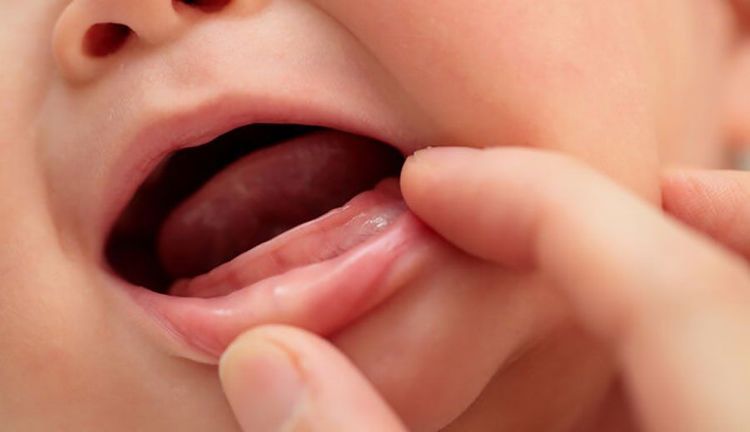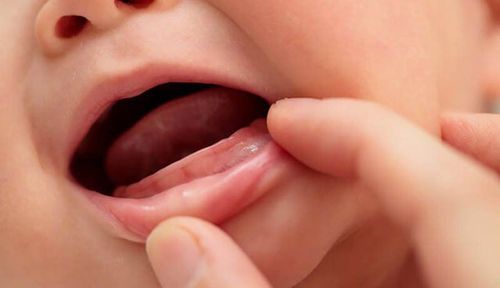This article is professionally consulted by Pediatrician - Neonatologist - Vinmec Nha Trang International General Hospital
Late teething is a condition in which baby teeth erupt late in children. If a child is over 12 months old and has not started teething, it is considered late teething, and parents should take their child to a dentist for examination and timely intervention. Because if this condition is left for too long, it can lead to negative complications later, such as: tooth decay, periodontal disease, misaligned permanent teeth…
1. The teething process in young children
Children will start to get their first tooth around the age of 6 months and will have a full set of teeth by about 2 or 2.5 years old. However, not all children have the same teething schedule. Some children teeth very early, while others are over 1 year old but still show no signs of teething. So why do children teeth late even though they are well-nourished?
In each child, the teething process is completely different, some children teeth early, some children teeth late. The number of teeth in a child is usually equal to the number of months minus 4. Normally, when a child is 6 months old, the first tooth will erupt. Children begin to erupt their lower central incisors first, then the upper central incisors, followed by the first primary molars, and then the canines. When the second primary molars erupt, it means that the baby teeth have erupted completely, 10 upper teeth and 10 lower teeth, at which time the child is about 3 years old. If a child is 13 months old and still has no teeth, it can be confirmed that the child is teething late.

According to the general standard, the order of teething in children will follow a process according to the following rule of 4:
- At the age of 7 months, the incisors begin to erupt
- At 11 months, all 4 central incisors erupt (including: 2 upper incisors and 2 lower incisors)
- At 15 months, 4 more lateral incisors erupt (meaning a total of 8 incisors)
- At 19 months, 4 more premolars erupt
- At 23 months, 4 more canines erupt
- At 27 months, 4 more molars erupt
- Permanent teeth begin to erupt from 6 to 12 years old.
- Wisdom teeth erupt much later, after 17 years old.
2. What is considered late teething?
Late teething is a condition in which baby teeth erupt late in children. If a child is over 12 months old and has not started teething, it is considered late teething.
Typically, children begin teething at around 6 months of age and will have a full set of 20 baby teeth by about 2.5 years old. Therefore, if a child is over 12 months old and has not yet erupted any baby teeth, your child is considered late teething.
For children who only have late teething but their physical development is still normal, it is due to the child's physiology.
If children have late teething accompanied by stunting, lack of height and weight, difficulty sleeping, night sweats, etc., it is likely that the child's late teething may be due to an inadequate diet.
However, if after 12 months, the child still has not teethed, it proves that the child is teething late, parents should take the child to the dentist for examination and timely intervention.
3. Causes of late teething in children
3.1. Objective causes
- Due to genetics: One of the main reasons for late teething in children is genetics.
- Consider your family history to see if anyone has had this problem. If so, you may need to wait longer for your child to teeth.
- Due to different birth times: Premature babies, underweight babies often have a slower rate of teething than babies born full-term and at a normal weight.
- Oral cavity infection: If a child has gingivitis or oral cavity infection, it can lead to late teething. Bacteria and fungi grow in the oral cavity, causing damage to the gums. As a result, the child's teeth cannot erupt. Children with late teething due to oral infection have bad breath, pain, and often cry. Some dental diseases, infections, and oral injuries, especially in the gums, also lead to late teething.

3.2. Subjective causes
- Due to hypothyroidism: Hypothyroidism can cause delayed teething in children. In this case, the child needs medical advice. Hypothyroidism can also cause slowness, delayed speech, and overweight in children.
- Due to congenital causes: According to doctors, late teething in children can be due to congenital causes and not necessarily due to a lack of nutrients in children. Premature babies often have a slower rate of teething than babies born full-term.
- Due to vitamin D deficiency: Vitamin D deficiency makes the body unable to use calcium to build bone and tooth structure. Therefore, vitamin D deficiency can be the reason why children are late in teething. The main source of vitamin D is sunlight. Please supplement it timely. Vitamin D deficiency can occur naturally in premature babies. Lack of Vitamin D will directly affect the absorption of Calcium.
- Due to calcium deficiency: When a child is deficient in calcium, the tooth buds will develop poorly and cannot erupt. Milk is the best source of calcium for children. In the first 6 months, babies are still breastfed, so if the mother is on a restrictive diet during breastfeeding, it will lead to a lack of calcium to supply the baby. In addition, the body's excessive absorption of phosphorus can also reduce the absorption of calcium in children.
- Due to lack of MK7: MK7 is a type of vitamin K2, whose main function is to bring calcium in the blood to bones and teeth, helping children's teeth grow evenly and healthily. With many children, they may have already supplemented enough calcium and Vitamin D, but the lack of MK7 means that the effectiveness is only about 30%.
- Excessive phosphorus absorption: Too much phosphorus prevents the body from absorbing calcium. Therefore, children with excess phosphorus will be deficient in calcium, causing the tooth buds to erupt slowly from the gums. Children with excess phosphorus also have other symptoms such as hardening of the blood vessels, kidney failure, and enlarged heart...
- Malnutrition: The child's physical condition is underdeveloped, not generating enough energy to supply the child's activities can also cause teeth to erupt later than in children with adequate nutrition and good physical condition.
- Some diseases in children: Children with Down syndrome or children with abnormal pituitary gland problems may also have slower teething than normal.
4. Is late teething dangerous for children?
Parents should not be too worried if their child is late in teething, as it is not dangerous for the child, and there is no need to compare with other children because each child's teething time is different. Some children have teeth at 4 months, while others are as late as 9-10 months. Depending on the child, the baby teeth will be fully grown at 2 or 3 years old with 20 teeth. If you are still not reassured, you can take your children to the dentist for examination and X-rays to determine if there are any abnormalities. Generally, children who are deficient in calcium will have slower teething than other children, but early teething does not mean enough calcium. There are many babies who are born with teeth, and this is a normal physiological process. If they have teeth at 3 months old, there is nothing to worry about. For babies who teeth early, parents need to pay more attention to the baby's picky eating. Teething babies may experience pain, fever leading to fatigue and loss of appetite, so during this period, parents should not pay too much attention to the baby's weight.

However, parents should not ignore the slow teething in children, because slow teething can be one of the signs of another disease that needs to be examined and treated promptly. In addition, if this condition is left for too long, it can lead to negative complications later such as:
- Permanent teeth will erupt misaligned due to baby teeth’s delayed eruption too slowly.
- Permanent teeth appear at the same time as slow-erupting baby teeth, creating "double rows of teeth"; a rare case is that permanent teeth will erupt before baby teeth. As a result, baby teeth and permanent teeth coexist, causing the baby to have two rows of teeth.
- Periapical inflammation due to teeth still under the gum surface.
- Tooth decay, even when the teeth are still under the gums, bacteria that cause tooth decay can still develop. This condition can spread, causing the child to have cavities in many teeth at the same time.
5. How to deal with late teething in children?
When you detect late teething in your child, the first thing parents need to do is to consider the child's health condition, find out the cause of late teething to find solutions to improve this condition.
Right from the stage of pregnancy and breastfeeding, mothers should eat a diverse and nutritious diet, and should not be too restrictive. Importantly, it is necessary to provide adequate nutrients such as calcium and vitamins for the fetus to develop as fully as possible.
To deal with late teething in children, mothers need to:
5.1. Change daily habits
Supplement with 400 IU of vitamin D per day for infants under 1 year old who are exclusively breastfed or formula-fed less than 600ml/day to prevent vitamin D deficiency in children.
5.2. Improve nutrition for children
- Ensure a balanced daily diet for children, especially milk and dairy products, animal foods, fats...
- The diet for children with late teething should ensure the elements of sugar, protein, starch, fat... Pay attention to providing enough protein and especially animal protein during the child's weaning process. You can add cooking oil to your baby's porridge (or porridge).
- Give your child more fresh fruits or you can juice them for your child to drink or puree them and give them to your child.
- In addition to milk as the main source of nutrition, mothers can also give their children yogurt or cheese.
- Train your child to eat at regular times and avoid snacking.
- Increase milk intake to 500-800ml per day. Especially, do not mix milk for children with porridge, powder, vegetable water... and especially mineral water because it can reduce the absorption of calcium.
- In addition, encouraging children to get enough sleep and encouraging children to exercise are also ways to stimulate children to eat well and avoid malnutrition.
Late teething in children is not dangerous, but to avoid the risk of bad complications later, parents should take their children to the dentist when they are over 12 months old and have not yet teethed. In addition, parents should also apply some methods to change habits and improve nutrition to support the better development of their child's teeth.
In addition, parents also need to supplement their children with essential micronutrients such as zinc, lysine, chromium, selenium, vitamins B1, ... to meet the full nutritional needs of children. Supplementation of these essential vitamins also supports digestion, enhances nutrient absorption, helps improve picky eating, and helps children eat well. Parents can simultaneously apply the method of supplementing substances through food and natural supplements for easy absorption by the baby. The most important thing is that improving the symptoms for the baby usually takes a long time. Combining many types of supplements at the same time or changing many types frequently in a short time can make the baby's digestive system unable to adapt and is completely not good. Therefore, parents must be really persistent in accompanying their children and regularly visit the Vinmec website to update useful information on child care.
LaminKid I Health Supplement: This product is formulated to supplement vitamins and minerals for the body. It supports digestion, enhances food absorption, and helps children eat well. It also supports the enhancement of the child's immunity, helping to reduce the risk of diseases caused by weak immunity such as upper respiratory tract infections and the common cold.
Target users:
- Children with poor appetite, poor absorption, thinness, malnutrition, and slow development.
- Children with weak immunity, who are sick or have just recovered from illness, and children who often suffer from upper respiratory tract infections and the common cold.
Responsible for product quality:
Elepharma Joint Stock Company
No. 9, Truong Cong Giai Street, Team 17, Dich Vong Ward, Cau Giay District, Hanoi City, Vietnam
(Tel) 1800 6091; (E) info.elepharma@gmail.com
For more information about the product, please visit: https://i.vinmec.com/laminkid
Register for nutritional counseling for your child at: https://i.vinmec.com/dangkytuvandinhduong
To arrange an appointment, please call HOTLINE or make your reservation directly HERE. You may also download the MyVinmec app to schedule appointments faster and manage your reservations more conveniently.








